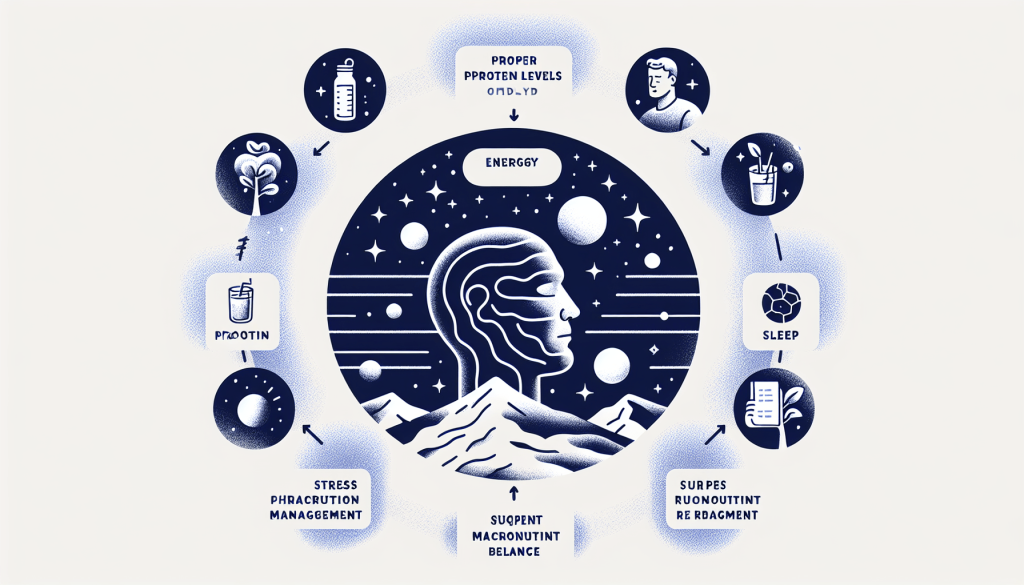Are you following the Carnivore Diet and finding it challenging to maintain your energy levels? Look no further! In this article, we have compiled the top 10 tips to help you keep your energy levels high while following this unique dietary approach. From choosing the right types of meat to ensuring proper hydration and incorporating essential nutrients, we’ve got you covered. So whether you’re a long-time Carnivore Diet enthusiast or just starting out, these strategies will help you stay energized and focused throughout the day.
1. Prioritize Protein Intake
Include a variety of animal proteins
When following the Carnivore Diet, it’s essential to prioritize protein intake. Animal proteins provide the necessary building blocks for your body to function optimally. To ensure you’re getting a well-rounded array of nutrients, aim to include a variety of animal proteins in your diet. This can include options such as beef, poultry, pork, fish, and eggs. Each protein source offers different essential amino acids and micronutrients, so incorporating a diverse range will help you meet your nutritional needs.
Calculate your protein needs
To maintain energy levels on the Carnivore Diet, it’s vital to calculate your protein requirements accurately. The recommended daily intake for protein varies depending on factors such as age, sex, weight, and activity level. Generally, a good starting point is to consume 0.6-1 gram of protein per pound of body weight. However, individual needs may differ, so consider consulting a healthcare professional or a registered dietitian to determine the optimal protein intake for your specific circumstances.
Consume protein with every meal
To sustain adequate energy levels throughout the day, be sure to include a source of protein with every meal. Protein is known to provide a feeling of fullness and satiety, which can help prevent energy crashes and maintain stable blood sugar levels. Whether you’re enjoying a hearty steak for dinner or opting for a protein-rich omelette for breakfast, make it a priority to incorporate protein into every meal you consume.
2. Ensure Sufficient Fat Consumption
Understand the importance of dietary fat
While protein is prioritized on the Carnivore Diet, it’s equally important to ensure sufficient fat consumption. Fat serves as a concentrated energy source and plays a crucial role in hormone production and nutrient absorption. Incorporating healthy fats into your meals can help provide the sustained energy you need throughout the day. Fat also assists in the satisfaction of appetite, making it easier to maintain a well-balanced and fulfilling diet.
Choose high-quality sources of fat
When it comes to selecting fats for your Carnivore Diet, opt for high-quality sources. Healthy fats can be found in foods such as grass-fed butter, tallow, lard, avocados, and fatty cuts of meat. These options provide a rich supply of essential fatty acids and fat-soluble vitamins, promoting overall well-being and energy maintenance. Remember to prioritize quality over quantity when it comes to fat consumption, as healthy fats can positively impact your energy levels.
Implement fat cycling
To optimize energy levels on the Carnivore Diet, consider implementing fat cycling. Fat cycling is a technique where you alternate between higher and lower fat intake throughout the week. This approach allows your body to continually adapt and prevents metabolic slowdown. On days when you require more sustained energy, consume meals higher in fat. Conversely, on lighter activity days or when you prioritize weight loss, lower your fat intake accordingly. Fat cycling can help fine-tune your energy levels and support overall dietary balance.

3. Stay Hydrated
Drink enough water
Proper hydration is essential for maintaining energy levels on any diet, including the Carnivore Diet. Water plays a vital role in numerous bodily functions, including digestion, circulation, and temperature regulation. Aim to drink enough water throughout the day to keep yourself properly hydrated. While individual hydration needs may vary, a general guideline is to consume at least half your body weight in ounces of water per day. For example, if you weigh 150 pounds, try to drink a minimum of 75 ounces of water daily.
Consider electrolyte balance
In addition to drinking enough water, it’s crucial to consider electrolyte balance, especially when following a low-carbohydrate diet like the Carnivore Diet. Electrolytes, such as sodium, potassium, and magnesium, are necessary for proper muscle function and hydration. As you reduce your carbohydrate intake, electrolyte levels can affect your energy levels. Consider including electrolyte-rich foods like bone broth, salt, and magnesium-rich leafy greens in your diet. Alternatively, you can also supplement with electrolyte tablets or powders to support electrolyte balance.
Monitor urine color
One simple way to determine your hydration status is by monitoring the color of your urine. A pale yellow color indicates proper hydration, while darker shades may indicate dehydration. By paying attention to your urine color, you can make adjustments to your water consumption and ensure you’re staying adequately hydrated. Remember, the goal is to maintain a consistent pale yellow color throughout the day as it signifies optimal hydration levels.
4. Balance Nutrient Intake
Include organ meats for vital nutrients
For optimal nutrient intake on the Carnivore Diet, consider incorporating organ meats into your meals. Organ meats, such as liver, heart, and kidney, are rich in essential vitamins and minerals that may be lacking in muscle meats alone. They are excellent sources of nutrients like vitamin A, B vitamins, iron, and zinc. Adding a variety of organ meats to your diet can help ensure you’re receiving a wide range of vital nutrients necessary for sustained energy levels and overall health.
Consume a wide range of animal products
In addition to organ meats, consuming a wide range of animal products is crucial for achieving nutrient balance on the Carnivore Diet. Each animal protein source offers varying levels of essential amino acids and micronutrients. By incorporating diverse options like beef, pork, poultry, and fish into your diet, you enhance your nutrient intake and support sustained energy levels. Aim to include different animal products throughout the week to maximize nutrient diversity.
Supplement when necessary
While prioritizing nutrient-dense animal foods is essential, certain individuals may require additional supplementation to meet their nutritional needs on the Carnivore Diet. Factors such as individual nutrient absorption, geographic location, and dietary restrictions can influence nutrient requirements. It’s advisable to consult a healthcare professional or a registered dietitian who specializes in the Carnivore Diet to determine if any specific supplements are necessary for you. They can assess your unique needs and recommend targeted supplementation to support your energy levels.

5. Maintain Prolonged Fasting Mindfully
Ease into longer fasting periods
Prolonged fasting can be a tool to further optimize energy levels and metabolic flexibility on the Carnivore Diet. However, it’s important to approach fasting mindfully and gradually. Start by incorporating shorter fasting periods, such as intermittent fasting, into your routine. As your body adapts and you become comfortable fasting for longer durations, consider gradually extending your fasting windows. Listen to your body and ensure that prolonged fasting aligns with your individual needs and goals.
Listen to your body’s hunger signals
During fasting periods, it’s crucial to listen to your body’s hunger signals. Pay attention to genuine hunger versus emotional or habitual cues. If you’re experiencing true hunger during a fast, it may be a sign that your body requires nourishment. However, if you’re feeling energized and well without the need to consume food, you may choose to continue fasting. Always prioritize your well-being and adjust your fasting schedule accordingly.
Stay hydrated during fasting
While fasting, it’s essential to stay adequately hydrated. Water intake becomes even more crucial during fasting periods, as it supports various bodily functions and helps maintain energy levels. Be sure to drink enough water throughout your fasts to prevent dehydration and associated symptoms like fatigue or dizziness. You can also include electrolyte-rich beverages, such as bone broth or herbal teas, to support your hydration and electrolyte balance during fasting.
6. Optimize Micronutrient Intake
Consume nutrient-dense animal products
To optimize your micronutrient intake on the Carnivore Diet, focus on consuming nutrient-dense animal products. These include options like organ meats, lean cuts of meat, eggs, and seafood. Nutrient-dense animal products are typically rich in essential vitamins and minerals such as iron, zinc, vitamin B12, and omega-3 fatty acids. By prioritizing these foods, you ensure you’re obtaining the necessary micronutrients to fuel your energy levels and support overall health.
Include organ meats and fish with omega-3s
Specifically, organ meats and fish are excellent sources of crucial micronutrients commonly found to be lacking in other dietary patterns. Organ meats, such as liver, provide essential vitamins A, D, E, K, and B vitamins. Fish rich in omega-3 fatty acids, such as salmon or mackerel, offer anti-inflammatory properties and support brain health. Incorporating these foods into your Carnivore Diet can provide a well-rounded micronutrient profile and further support your energy maintenance.
Consider targeted supplementation
While the Carnivore Diet emphasizes obtaining nutrients from animal-based sources, some individuals may require additional supplementation to ensure optimal micronutrient intake. Vitamin D, for example, is primarily obtained from sunlight exposure, so individuals in regions with limited sunlight may benefit from supplementation. It’s essential to consult a healthcare professional or registered dietitian to assess your individual needs and determine if targeted micronutrient supplementation is necessary for you.
7. Manage Stress Levels
Practice stress-reducing techniques
Managing stress levels is crucial for maintaining energy on the Carnivore Diet. Chronic stress can negatively impact numerous bodily functions, leading to decreased energy levels. Incorporate stress-reducing techniques into your daily routine, such as meditation, deep breathing exercises, or engaging in hobbies that bring you joy. Find what works best for you and make it a priority to prioritize relaxation and stress management.
Get enough quality sleep
Quality sleep is essential for optimal energy levels and overall well-being. Aim to prioritize regular sleep patterns and create a conducive sleep environment. Establish a bedtime routine, optimize your sleep hygiene, and ensure you’re getting the recommended 7-9 hours of quality sleep per night. Consistent and restful sleep plays a significant role in maintaining energy levels and supporting general health.
Engage in regular physical activity
Regular physical activity is not only important for overall health but can also help manage stress levels and enhance energy. Find physical activities that you enjoy and incorporate them into your routine. Whether it’s a brisk walk, resistance training, or yoga, engaging in regular exercise can boost endorphins, reduce stress, and improve energy levels. Just be sure to listen to your body and adjust your activity level based on personal abilities and energy requirements.
8. Support Gut Health
Include fermented foods in your diet
Maintaining a healthy gut is crucial for optimal digestion and nutrient absorption. Including fermented foods in your Carnivore Diet can support gut health. Options such as sauerkraut, kimchi, and kefir are rich in beneficial probiotics that can enhance gut microbiota diversity and function. These probiotics help break down food, improve nutrient absorption, and support a healthy immune system. Aim to incorporate small amounts of fermented foods into your diet regularly for optimal gut health.
Consider probiotic and prebiotic supplementation
In addition to fermented foods, some individuals may benefit from probiotic and prebiotic supplementation to support their gut health on the Carnivore Diet. Probiotics are live beneficial bacteria that can aid in gut balance, while prebiotics serve as food for these friendly bacteria. Consult a healthcare professional or registered dietitian experienced in gut health to determine if probiotic or prebiotic supplementation is necessary for you. They can provide personalized recommendations based on your specific needs.
Avoid inflammatory foods
To maintain a healthy gut and optimize energy levels, it’s vital to avoid inflammatory foods that can disrupt gut health. While the Carnivore Diet primarily focuses on animal-based foods, it’s crucial to be mindful of any trigger foods that may cause gut inflammation or discomfort. Common inflammatory foods include processed meats, vegetable oils, artificial additives, and excessive sugar. Listen to your body, note any adverse reactions to specific foods, and adjust your diet accordingly to support gut health and energy maintenance.
9. Listen to Your Body
Pay attention to hunger and fullness cues
Listening to your body’s hunger and fullness cues is essential for maintaining energy levels on the Carnivore Diet. Each individual may have unique needs and tolerances, so it’s essential to pay attention to your own body’s signals. Eat when you genuinely feel hungry and stop when you feel comfortably satisfied. This mindful approach to eating can help you maintain energy balance and prevent both overeating and undereating, which can negatively impact energy levels.
Adjust your diet as needed
As you navigate the Carnivore Diet, be open to adjusting your diet based on your body’s response and your individual goals. Some individuals may thrive on a higher protein intake, while others may do better with slightly higher fat consumption. Monitor your energy levels, focus, and overall well-being, and make adjustments based on what works best for you. Experimenting with different ratios of protein and fat, as well as potential additions like small amounts of carbohydrates or intermittent fasting, can help you find the optimal approach for your energy maintenance.
Monitor energy levels and overall well-being
Regularly monitoring your energy levels and overall well-being is crucial for ensuring you’re thriving on the Carnivore Diet. Energy levels can vary day to day, so it’s essential to establish a baseline and notice any significant fluctuations. Keep a journal to track your energy, mood, digestion, and any other relevant factors. By noting any patterns or changes, you can make informed decisions about your dietary choices and make adjustments as needed to support your energy levels and overall well-being.
10. Seek Professional Guidance
Consult a healthcare professional
If you’re considering or currently following the Carnivore Diet, it’s important to consult a healthcare professional. They can assess your individual health status, evaluate any specific concerns or conditions, and provide guidance tailored to your needs. A healthcare professional can help you navigate the Carnivore Diet safely, address any potential nutrient deficiencies, and ensure that you’re maintaining optimal energy levels while supporting your overall health.
Work with a registered dietitian
A registered dietitian with expertise in the Carnivore Diet can provide personalized guidance based on your specific needs and goals. They can help you fine-tune your nutrient intake, optimize energy maintenance, and address any unique challenges you may face. Working with a registered dietitian can provide valuable support, education, and accountability throughout your Carnivore Diet journey.
Join supportive carnivore communities
Lastly, consider joining supportive carnivore communities where you can connect with like-minded individuals following the same dietary approach. Online forums, social media groups, and local meet-ups can provide a sense of community and offer valuable insights, tips, and inspiration. Sharing experiences and learning from others can enhance your knowledge of the Carnivore Diet and help maintain your energy levels long-term.
By following these ten tips, you can maintain energy levels on the Carnivore Diet while prioritizing nutrient intake, supporting overall health, and optimizing your well-being. Remember to prioritize high-quality animal proteins, manage stress levels, stay hydrated, and listen to your body’s signals. Seek professional guidance from healthcare professionals and registered dietitians to ensure you’re optimizing your nutrition and energy maintenance on the Carnivore Diet.
